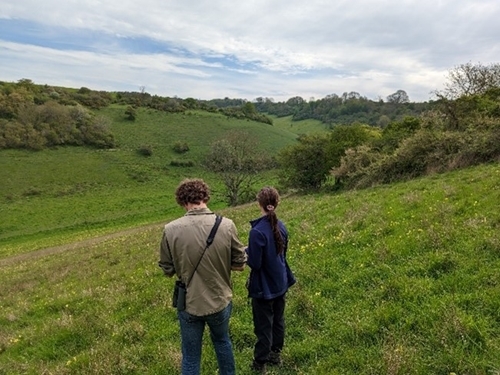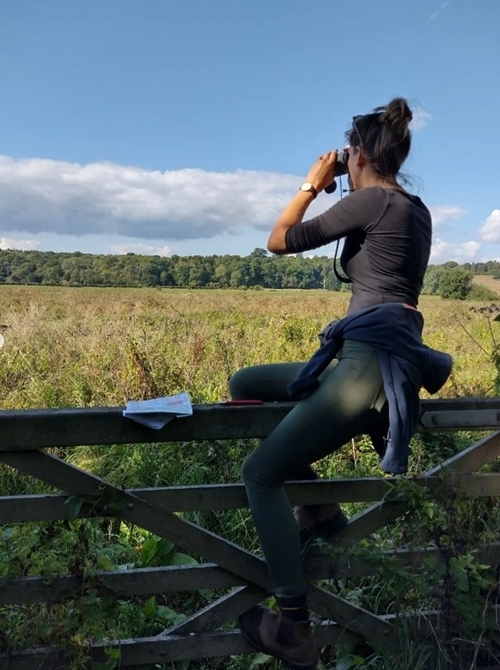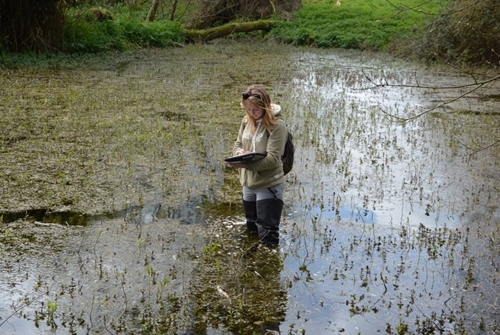
Boots and sunnies on, sandwiches packed, clipboards at the ready… GWCT’s Advisors are out and about and busier than ever with biodiversity audits!
Whether it be in Devon or Norfolk, North Yorkshire or West Sussex, we’re out doing biodiversity audits on fields, whole farms and estates. These are being commissioned by an increasing number of landowners ahead of the acceleration of the much-talked-about natural capital and Biodiversity Net Gain market.
Come November 2023, a Biodiversity Net Gain (BNG) of at least 10% is going to be mandatory for many types of developments in England, but many councils are requiring it already. BNG should be provided on-site as a first choice (i.e., the site of the development itself). If that’s not possible, BNG should be provided off-site nearby, and as a last resort it can be achieved elsewhere in the country using government schemes. Once off-site, farms and estates, through a trade, can provide the biodiversity gain.
To find out how much BNG a farm or estate could theoretically and practically provide, a biodiversity audit is required. Here’s where our Advisors - who form part of the new GWCT Natural Capital Advisory service - come in.
What’s a farm biodiversity audit?
Biodiversity audits are field surveys undertaken by advisors who have special training in ecology assessment. They identify habitats and assess their condition against criteria set by Defra, before assigning them a number of ‘units’ in Biodiversity Metric 4.0: the industry’s official metric tool. Unlike some online or app-based natural capital services, we put boots on the ground to identify habitat types and species with high accuracy and assess the real-time condition of habitats. The field survey is followed by desk analysis and a written report, setting out how many biodiversity units your farm contains and the potential tradeable ‘uplift’ in units you could achieve by creating or improving habitats.

How long does a biodiversity audit take and how much does it cost?
Biodiversity audits range from 1km2 samples from which the results are extrapolated to build a broad picture for business planning purposes, right through to detailed audits of every field and feature which can then function as a definitive ‘line in the sand’ for future trading or monitoring purposes. It usually takes one full day of fieldwork to survey a 100hectare representative plot, though complex sites and larger holdings can take several days. The surveys are best performed between spring and autumn, to accurately assess vegetation species and structure.
The cost of an audit and reporting depends on the size of the land to be assessed. You can enquire about the cost of a biodiversity audit here.
Who is already having biodiversity audits?
Farmers from 12 counties across the UK have commissioned audits so far, with a good proportion coming from the Environmental Farmers Group (EFG) in the Hampshire Avon catchment in England. The EFG is a pioneering farmer-led natural capital trading co-operative that is expanding quickly across the region. It aims to facilitate access for its over 100 farmer members to private nature markets, providing a fair financial return on restoring their natural capital through the sale of biodiversity units, nutrient offsets, and carbon credits. The EFG farmers are commissioning biodiversity audits to give them an understanding of the potential income and environmental achievements for some or all of their land.
Natural Capital Advisory has been a key partner for the EFG since 2022. EFG has received widespread recognition in the farming industry and it was highlighted as a case-study in the UK Government’s 2023 Green Finance Strategy.

What else does Natural Capital Advisory do?
Natural Capital Advisory offers advice and support services to farmers, investors, corporates, developers and councils across the UK.
At its core is the well-respected GWCT Advisory team, managing direction from Recce Rural, and a dedicated operations team. This unique collaboration of people ensures that the best environmental outcomes are achieved whilst having commercial expertise, and our hands-on experience and industry connections all combine to provide an unrivalled service.
NCA has five main activities to achieve its vision of delivering environmental good for fair reward:
- convening (getting groups of farmers together to form a trading platform)
- biodiversity baseline audits (an on-farm assessment that calculates baseline units and potential to trade)
- brokering (facilitating natural capital trades)
- environmental monitoring (follow-up service on habitat improvement or creation)
- pioneering new codes and systems (e.g., Hedgerow Carbon Code).
Find out more about Natural Capital Advisory and get in touch by going to our website.